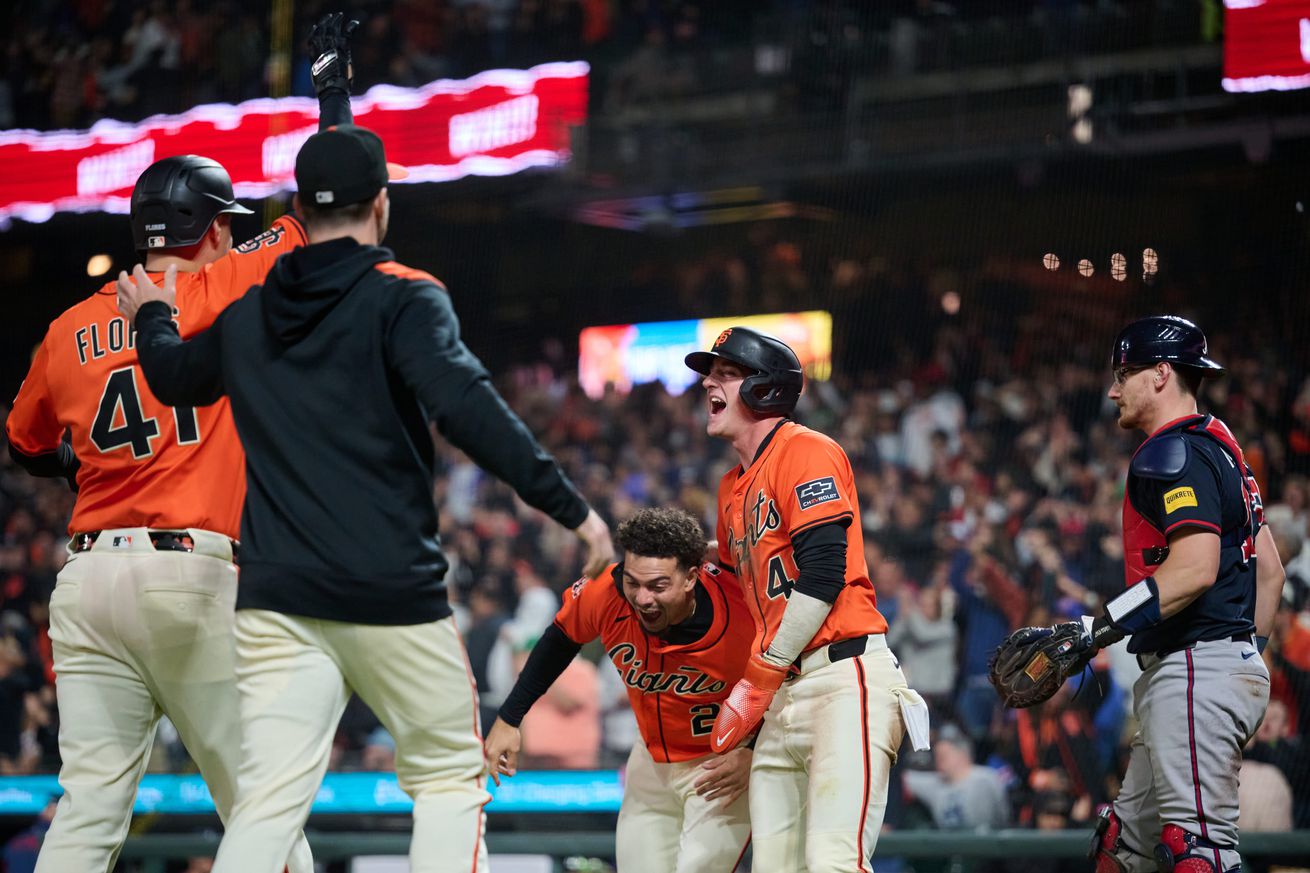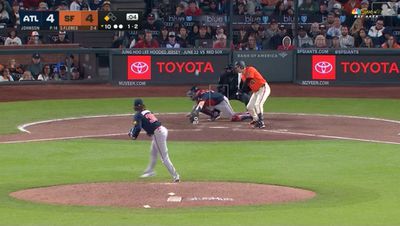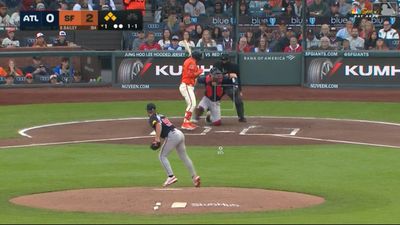
In a game of competing mistakes, the Giants lost…which means they won…
In Friday’s opener between the Atlanta Braves and San Francisco Giants, there was an air of wildness emanating from the mound. Baseballs were skidding across opposite batter’s boxes, digging craters in front of home plate, skipping past catchers to the back stop.
Some of this is by design of course. With count leverage, he doesn’t need to be refined. This game is about hitting a rock with a stick. A crude offering has been known to elicit a crude hack, so why not push those boundaries? Sometimes a pitcher needs to bury a curveball and aims to bounce it off the plate. The gamble is that a ball in the dirt becomes more of a liability, a little less predictable. There are expectations of performance to mitigate these risks: when the pitcher intentionally spikes his throw, it needs to be close enough to the catcher for him to lean over it and smother it; when there’s a ball in the dirt, the catcher doesn’t become a catcher at all, but a blocker.
It was a failure of these expectations that sunk the Braves and floated the Giants on Friday night. One sin committed by a pitcher in the 1st, and once by a catcher in the 10th. Worse yet, both errors happened with two outs, with a runner on third base, and, in a contest decided by one-run, both mattered.
The #SFGiants’ MLB-leading SEVENTH walk-off victory of the season
Braves reliever Pierce Johnson is all junk all the time. He threw 15 pitches in the 9th and 10th innings and 14 of them were curveballs. He got an unproductive out from Heliot Ramos to lead off the 10th, and Jung Hoo Lee rolled a weak grounder to second to advance Tyler Fitzgerald to third. But his command was a bit sporadic. A lot of his offerings were up in the zone, popping out of his hand rather than snapping out of it. Still, the top of the line-up bats couldn’t square it up, and Wilmer Flores fell into a quick 1-2 hole. Count leverage, with pitches to play with and a base to play with, there is no expectation to be too fine, or to overthink what to throw next. Johnson isn’t a reliever in that moment, he’s an undertaker: bury the curve, bury the batter.
You’ll note that in one sense, Johnson does the job. What he throws in the general vicinity of the plate is a curveball down and out of the zone. The initial concept of that 1-2 pitch was for it to come in at that shoe-top height, but just a scooch more to the right. It’s a bad pitch, an easy take — but was it “wild?”
Scorekeepers are fettered to their book. They live on the surface of the action. Interpretative work doesn’t come into play, nor should it. What happened is Johnson hooked a hook into the dirt, and the baseball understandably scooted past catcher Sean Murphy, allowing the winning run to score.
Now that the book is closed on that play, the more critical digging can begin. I think any catcher who’s put the work into becoming a professional backstop will say Murphy went after that offering all wrong. Clearly the pitch missed the location, but with a runner on third, Murphy shouldn’t have tried to pick that hop with his glove. On a pitch away from the intended target, with no room to error, Murphy needs to corral, to block, to keep the ball in front of him. Again, he is no longer a catcher but a blocker. The root cause of this misplay is he’s a 30-year old catcher in the 10th inning of play. It’s also the one-knee down receiving position that’s all-the-rage now. The posture helps with framing pitches by bringing pitches down in the zone up into it, but the drawback is that it grounds the catcher in a less athletic position. It looks like the lateral break of the pitch surprised Murphy. The baseball kept tailing away from him after he committed to gloving it, and by the time it hit the ground, he was knotted up in a clumsy posture with his glove arm stretched across his chest pulling his upper body forward and away from his lower half. His legs hardly moved, he didn’t get completely to his knees, he fell forward going after the ball, and that was the game.

Murphy’s mistake in the 10th foreshadowed byAtlanta starter Spencer Schwellenbach’s mistake in the 1st.
The whoopsie: an overthrown splitter, trying to do too much to get him out of a frustrating first frame. But reality and the official scorebook were aligned here. When the broadcast locates an offering on the infield grass, that’s a cut-and-dry wild pitch.

Even the robots had trouble locating where the baseball ended up. It actually kicked off the dirt closer to the plate, but if a pitch is spiked in front of home plate, there’s really not much Murphy can do. The further away from the catcher the pitch is, the more unpredictable the hop will become. He actually does what he should’ve done in the 10th (an example of the difference in leg-strength, energy level for a catcher in the 1st frame and in extras). He gets on to his feet and wears the ball off his chest, but it’s the Hail-Mary gamble of a goalkeeper on a penalty kick. You have to be big and then guess big. Murphy goes one way, and the baseball goes the other. I mean, if Wilmer Flores is going to be able to score on a wild pitch, it’s got to be real wild.
The wild pitch punctuated a 3-run 1st for the Giants. San Francisco hadn’t scored in the first frame of a game since last Friday, and hadn’t put a crooked number in the 1st since April 19th (3-2 win v Angels). Three consecutive singles by Heliot Ramos, Jung Hoo Lee and Wilmer Flores got things started, and Dom Smith lifted his first of two sacrifice flies to drive in Lee.
And with two outs, the Braves started to pass out gifts. Schwellenbach got what should’ve been a trouble-ending ground ball off the bat of Willy Adames, but third baseman Austin Riley booted it. Schwellenbach then walked Mike Yastrzemski on four-straight pitches before drilling that splitter into the ground.
Two errors, a walk and a wild pitch — a rally partially funded by handouts. It wouldn’t be the last. That frame set the tone for the rest of the game, with both teams seemingly competing in generosity. While the two run-scoring wild pitches take the cake, San Francisco pitching did their darnedest to keep the Braves in this game.
Hayden Birdsong, who struck out 4 through the first three frames, went haywire in the 4th. The strike zone became a mirage, a distant and impossible to attain oasis.
Birdsong hit Matt Olson with a curveball to lead off the inning, then needed just 9 pitches to walk Marcell Ozuna and Ozzie Albies. Alex Verdugo almost immediately cashed in on the rally-for-free, missing a game-changing grand slam by a foot or so. Birdsong ultimately got Verdugo to strike out, but Murphy brought in Atlanta’s first run on a sac fly and Michael Harris III brought in their second on a 2-out, 2-strike single — their first knock of the game.
Birdsong came out for the 5th but an infield single and another walk to Olson ended his night at 90+ pitches. He needed just 46 pitches to get through the first three innings, but required about 50 to record the next four outs. He walked 5 and hit a batter over 4.1 IP, but with Tristen Beck coming on in relief, had his book closed with the lead in-tact, allowing 2 runs on 2 hits while striking out 5.
With Birdsong derailed, the game’s momentum seemed to slide towards Atlanta. The Giants added a run in the 5th on another sac fly by Smith, but the bullpen struggled to come up with stress-free frames. San Francisco pitching surrendered a three-run lead by walking seven batters and hitting two of them over the 10 innings.
Beck had to be pulled in the 6th after giving up a two-out single, throwing a wild pitch, then walking number-9 hitter Nick Allen to bring up Ronald Acuña Jr. A back-up slider from Ryan Walker got Acuña swinging to end the 6th, but in the 7th, he hung another slider (pretty much the same location as the Acuña one) to lefty Matt Olson who did not miss it.
With the game tied, when you’d hope the Giants would lock-in and focus, inhibition won out. They approached both sides of the ball with arms stretched-out, an open hand.
That exposed style of play was the most evident on the bases. Ramos and Lee both reached first to lead-off the 7th against veteran Craig Kimbrel, and without a ball being put in play, both were erased on the base paths.
I don’t mind the caught-stealing by Ramos — it was a close play, and on an elevated fastball, it wasn’t a great pitch to go on. I get the desire to be aggressive and make something happen. Scoring position with nobody out and a contact hitter like Lee at the plate is a good start to a run-producing recipe — but I do think the aggressiveness against a struggling team like Atlanta was a bit near-sighted. Kimbrel clearly hadn’t settled in — it was his first appearance of the 2025 season — and he ultimatey walked Lee on four-pitches. Waiting to see how the at-bat developed would’ve given Ramos enough information to see that Kimbrel would’ve just given second to him for free rather than jumping to the conclusion that he had to take it.
Caught stealing — fine. Risk is part of the fun. The straight pick-off of Lee though was not as forgivable, especially when acting as the winning run with the big thumpers in the line-up at the plate.
Okay, well, live and learn. It won’t happen ag…
If the Giants lost this game, the base running SNAFUs would’ve be the story. Losing the winning run on the basepaths three times in the final three frames is a no-no, especially when some of the team’s hottest hitters were at the plate. Still, in his postgame interview, Fitzgerald didn’t seem too contrite about the pick-off to end the bottom of the 9th. Sounds like this kind of aggressiveness in these lean times is part of the game plan for the Giants.
Outs for free. Then in the 10th, Erik Miller started to hand out bases for free. With two outs, they elected to intentionally walk Murphy to get the lefty match-up with Michael Harris who Miller promptly hit to load the bases and put the go-ahead runner at third. Spencer Bivens took over and nearly walked in the Manfred Man for theBraves fifth run, but Luke Williams couldn’t resist a 3-2 sinker inside, nor could he out-run a Matt Chapman cannon.
A night defined by freebies, and ultimately, it was the scuffling Braves who walked off the diamond looking up to the sky, cursing their dulled killer-instincts that defined their sustained success for so many years. They lost a 6-run lead in the 9th on Thursday, a wild-pitch cost them in this one. They’re now 9 – 17 in one-run games, the Giants are 14 – 12. It was San Francisco’s seventh walk-off win of the year, which leads the Majors; and their twelfth game in a row decided by two-runs or fewer.